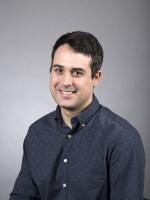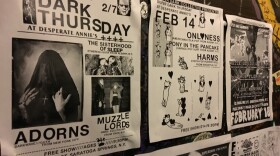The pandemic has caused a wide range of stresses and anxieties, and many artists and musicians have used their extended time at home to create.
Members of the Capital Region live music community have come together for a compilation album for charity. All proceeds will go toward Direct Relief, an international humanitarian aid organization that is working to bring PPE and medications to healthcare facilities.
Local musician Keith Sonin helped organize the project calledThe 518 COVID Quarantine Compilation, featuring 17 songs from artists connected to the Capital Region.
WAMC's Lucas Willard spoke with Sonin about the project, and how the songs reflect the times we’re living in.
A lot of my friends, and a lot of the music we make, is inherently dark. I guess, or at least a little dark. But especially now, you know, because a lot of it was obviously going to be anxious and paranoid. And, you know, we're all sitting at home and kind of freaking out and having uh, what do you call it, like 'cabin fever'?
By bringing all these different artists together, people you've known, people who are friends of friends together, what's the message that you wanted to send, in addition to the lyrics and the songs?
Well, um, I kind of thought of this as like, a bridge between old and new. Because it's got a lot of, you know, people from the old scene of like, when I started like, on the Albany scene in the 2000s, and people in-between, and younger people and older people. And I wanted us to just basically all come together and be like, we all appreciate the same things, we all like- Not the same music necessarily, but we all like the same spirit of music, and we all like honest music, and music that's just doing- It's sincere and that's what you feel. And it's non-corporate, non- like, 'I want to become a rock star' kind of stuff. It's more like- It's about community, it's about going to see other people and making friends and you know, enjoying and appreciating new music that you wouldn't see otherwise.
And this is all for charity too. So people can go online and purchase the comp. Tell me about the charity and where the money is going to.
I wanted to get the money to some organization that's really on the front lines with COVID-19. And really, I think making a difference right now, and Direct Relief is the name of the charity. And I feel like they're really doing the most right now that supports like health care workers and get some of the equipment that they need. And all we're hearing about in the news is like, you know, "They need more ventilators or they need these medicines", which they're just in short supply for whatever political reasons. So what Direct Relief is doing is just trying to get them those very basic things that they need.
There will be people who listen to this interview that have not heard of any of the musicians or on this compilation. Maybe to them this music might seem a little intimidating, but what would you say to them?
That's interesting, intimidating? Well, definitely, I mean, it was a conscious attempt to kind of bring in, people who wouldn't otherwise listen to say, you know, the weird noisy stuff with, say, a pop-punk song and bring them in so that they kind of- Even if they're not going to listen to it over and over again, they'll sample it and they'll hear something that they weren't necessarily going to hear otherwise. And if a track is intimidating, you know, they can skip it. But I think the great thing is the exposure, just like on the radio, when you turn on the radio, you know, you never know what you're going to expect. If you just like playing album. It's like, "Oh, I've heard this album a million times. I love it", but I'm never going to hear anything new unless I'm exposed to some new stuff, some way.
We work really hard on it, and we always have. Regardless of whether we're going to make money on it or not, which, you know, most of us don't, and don't over ever expect to. To know that there are people like that out there in your community, in every community, you know, and this is just a small sample of it. If that word gets out to people, and then maybe in the future, they'll not only listen to it, but come out to our shows. That's the greatest thing I could see happening from this other than, obviously, the benefits to charity.






